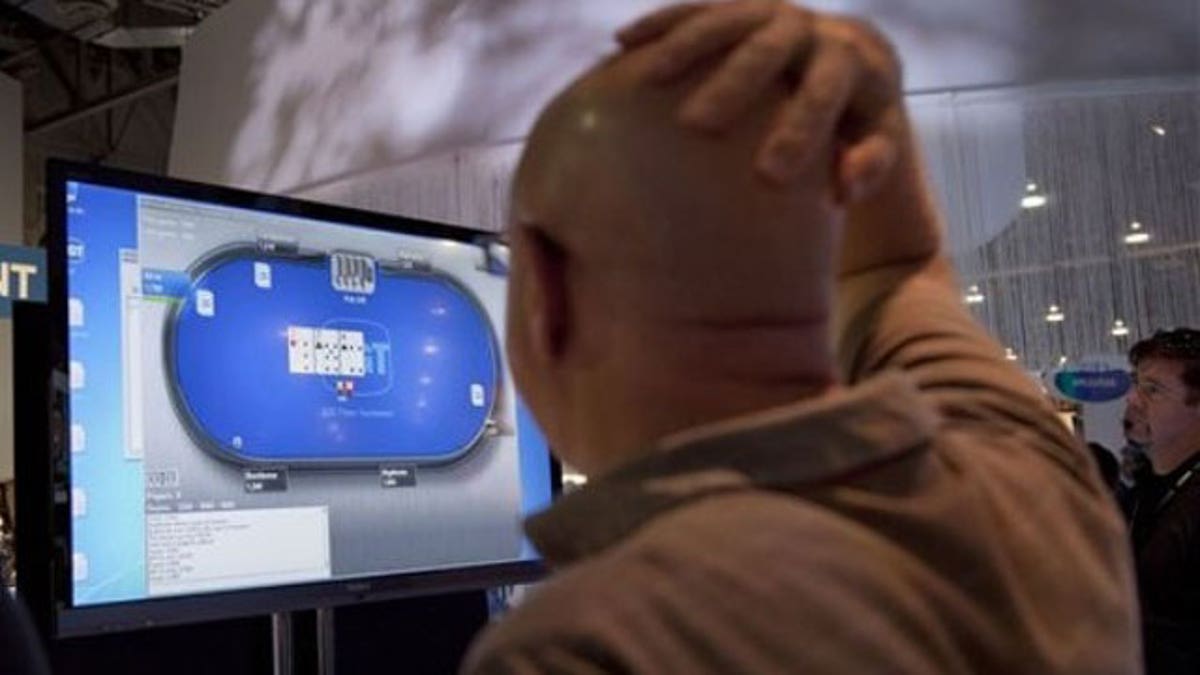
October 4, 2011: Casino industry representatives and exhibitors watch an online poker game during industry's G2E conference in Las Vegas. (AP)
WASHINGTON – A new opinion from the Justice Department opens the door for states to allow various forms of online gambling operated by lotteries and other gambling interests, legal experts say.
Proponents of legalized online gambling say the business could provide new sources of revenue for state coffers. But others, including large casino interests that prefer a national system limited to online poker, say that the free-flowing nature of the Internet is ill-suited for state gambling plans, which would attempt to limit online gambling to within a given state's borders.
The opinion from the Justice Department—dated in September and released Friday—reverses a policy it followed over the past decade, which held that most forms of online gambling were illegal under the Federal Wire Act; the 1961 act prohibits bets from passing through communications lines that cross state borders.
Under previous presidential administrations, the Justice Department had declared that based on its interpretation of the Wire Act, states shouldn't allow online gambling even for bets placed within their borders.
In a sweeping reversal, the Justice Department's Office of Legal Counsel said that such gambling within a state would no longer be considered illegal because the Wire Act—a law with contradictory language that has long been the subject of debate—doesn't apply to any forms of gambling other than sports betting.
The change essentially gives states the green light to allow gambling within their borders, online gambling experts said. That is a victory for advocates of state-regulated online gambling, which include companies hoping to provide technology for online gambling and in some cases lotteries and others that operate gambling in states, such as Indian tribes or casinos.
The decision was made public just a day after Nevada regulators voted to adopt the first-ever state regulations around online poker, which for now would allow companies to operate poker sites limited to players within Nevada.
Washington, D.C., voted this year to allow its lottery to operate online poker, but the law hasn't yet been implemented. Several state lotteries, meanwhile, already have been offering subscription services for lotteries online for the past few years. Statehouses and lotteries around the country have recently considered proposals to allow online gambling; some of those would be limited to online poker games.
The new decision from the Justice Department specifically concerns "intrastate" gambling, which means bets are both taken and placed within a given state's borders. The decision doesn't address gambling between states, but experts said it is likely to be considered legal as long as both states involved specifically allow it.
"This really helps out state governments a lot," said Melissa Riahei, a former general counsel for the Illinois state lottery who now is general counsel for U.S. Digital Gaming, a company lobbying statehouses for online poker.
Laura Sweeney, a spokeswoman from the Justice Department said in an emailed statement that the department would still be able to investigate and prosecute gambling businesses under laws other than the Wire Act.
To read more on this story, see The Wall St. Journal article here.




